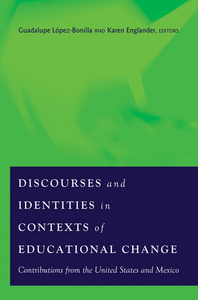Introduction: Educational progress and social order
Lankshear, Colin (2011) Introduction: Educational progress and social order. In: López-Bonilla, Guadalupe, and Pérez Fragoso, Carmen, (eds.) Discourses and Identities in Contexts of Education Change. Counterpoints: Studies in the postmodern theory of education (387). Peter Lang, New York, USA, pp. 1-19.
![[img]](https://researchonline.jcu.edu.au/18112/2.hassmallThumbnailVersion/18112_Lankshear_2011_Cover.jpg)
|
Image (JPEG) (Book Cover)
- Cover Image
Download (60kB) |
|
|
PDF (Published Version)
- Published Version
Restricted to Repository staff only |
Abstract
This book brings together a diverse group of collaborating authors from Mexico and the United States, predominantly from the neighboring states of California (United States) and Baja California. This creates very interesting possibilities for addressing the theme of discourses and identities within contexts of educational change within the current conjuncture, in view of such considerations as language and population demographics north of the border, immigration policies and dynamics, economic and wider cultural trends associated with the North American Free Trade Agreement (NAFTA), histories of academic collaboration (not to mention history itself), and the comparatively high levels of penetration of new (and not so new) technologies and their extension into everyday popular culture on both sides of the fence. These possibilities are amplified by the book's organization around three expansive themes that tap strongly into its focus on educational change: educational practices and identities; literacy, youth cultures and virtual spaces; and educational policies and professional identities. Each theme is addressed by North American and Mexican participants, infusing multiple perspectives into the discussion. The outcome is a nicely integrated discussion of wide-ranging aspects of discourse and identity in relation to engagement in formal education and non-formal learning under contemporary conditions.
Within the chapters that follow, we encounter first-hand accounts of the experiences of Mexican adolescents engaging in "team work" at high school and using new technologies under conditions of economic scarcity; of high academic achieving students of color from low socioeconomic status back grounds negotiate challenges posed by the cultural and geographic distance between home and school; of indigenous educators taking up an official discourse of intercultural bilingual education within community settings in Baja California that are far removed and different from their own cultural roots and those of the indigenous groups they have been recruited to serve. We trace the steps of a Mexican academic developing a new discoursal identity-and the implications for his autobiographical identity-as the price for being accepted into membership of an elite discourse community publishing in "high impact" English language scientific journals; explore the impact of changes in California's policies on medium of instruction on opportunities for learning and potential identity construction within one teacher's fifth grade classrooms during 1993-2000; and get a perspective on the relationship between teachers' identities as members of the national teachers' union in Mexico and their identities and performances as pedagogical practitioners. And, we are presented with two complementary perspectives on relationships between discourses, identities and learning, focusing respectively on the role that knowledge-in-action plays within development of "disciplinary identities and disciplinary literacy and discourse skills," and on the potential of "game-like learning" for developing ways of reading, writing, speaking and thinking associated with deep learning.
This book could be read in many ways. My way reads it as a text that moves between forms of social research that speaks about questions of meaning, action and social order, on the one hand, and forms of educational inquiry undertaken with a view to contributing towards promoting better quality learning and more equitable academic achievement, on the other. In the final analysis, the book prompts difficult questions about the relationship between how formal learning is socially ordered and the ideal of enhancing learning on an equitable basis.
| Item ID: | 18112 |
|---|---|
| Item Type: | Book Chapter (Research - B1) |
| ISBN: | 978-1-4331-0929-4 |
| Date Deposited: | 14 Dec 2011 01:11 |
| FoR Codes: | 13 EDUCATION > 1302 Curriculum and Pedagogy > 130202 Curriculum and Pedagogy Theory and Development @ 100% |
| SEO Codes: | 93 EDUCATION AND TRAINING > 9302 Teaching and Instruction > 930201 Pedagogy @ 50% 93 EDUCATION AND TRAINING > 9303 Curriculum > 930302 Syllabus and Curriculum Development @ 50% |
| Downloads: |
Total: 751 Last 12 Months: 1 |
| More Statistics |



